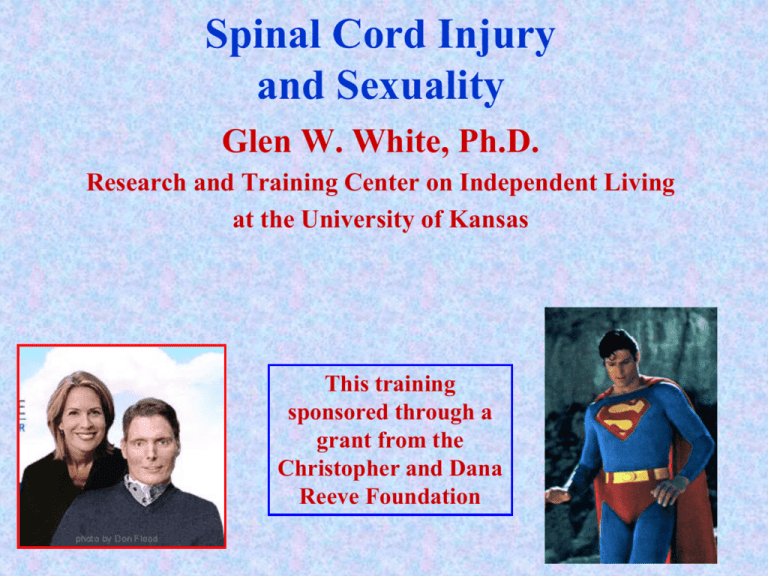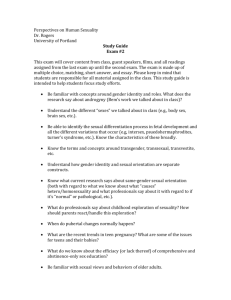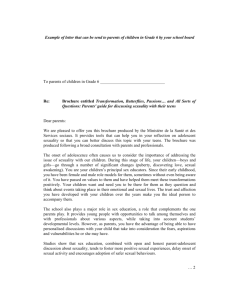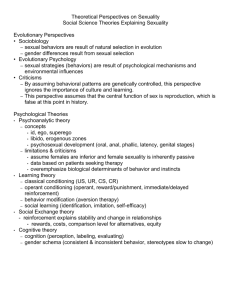
Spinal Cord Injury
and Sexuality
Glen W. White, Ph.D.
Research and Training Center on Independent Living
at the University of Kansas
This training
sponsored through a
grant from the
Christopher and Dana
Reeve Foundation
Special thanks to…
• The Christopher and Dana Reeve Foundation
• Centers for Disease Control
• Ann Sullivan Center of Perú
• Dra. Liliana Mayo and Staff members
• Scott Richards, Ph.D. – Spain Rehabilitation
Center, University of Alabama at Birmingham
• Suzanne Groah, M.D., M.S.P.H. – National
Rehabilitation Hospital, Rehabilitation
Research & Training Center on Secondary
Conditions in the Rehabilitation of Individuals
with Spinal Cord Injury
Special thanks to…
• Sam Ho
• Jaime Huerta
• Monica Ochoa
• And special
thanks to Julio
Chojeda for
translation of
materials from
English to
Spanish…
Acknowledgement of sources used for this
presentation:
Yes You Can! (Paralyzed Veterans of America)
SCI: A Manual for Healthy Living (TIRR)
Sexuality (RTC/IL & PVA)
Sexuality and Reproductive Health: What You Should
Know (by the Consortium for Spinal Cord Medicine)
Presentation Preview
• Define Sexuality
• Facts on SCI and Sex
• Volunteer Activity
• Myths on SCI and Sex
• Male and Female Sex Organs
• Stages of Sexual Response
• Human Sexual Response Cycle
• How can SCI affect Sexual Response and Activity?
• Fertility Issues for Men and Women
• Birth Control Techniques
• Sexually Transmitted Diseases
• Way to prevent sexual exploitation
SCI and Sexuality: Some Facts
FACT #1:
• For people with
disabilities, the lack of
physiological sensation
does not mean the lack
of sexual desire.
FACT #2:
• It takes more than a
stiff penis to make a
solid relationship.
SCI and Sexuality: Some Facts
• The Dictionary defines
sexuality as:
• The conditions of being
characterized and
distinguished by sex.
• Concern or
preoccupation with sex.
• The quality of possessing
a sexual character or
potency.
SCI and Sexuality: Sensuality
• What qualities do you
think of in a person to
be considered sensual or
sexual?
•
•
•
•
•
•
a good figure
Attractive
Nice personality
Sexy
Healthy
Good conversationalist
SCI and Sexuality: Sensuality
• What qualities do you
think of in a person who
is not sensual or non
sexual?
• What are turnoffs?
• Drunk
• Ugly
• Bad-tempered
• Boring
• Self-centered
• Unattractive
• Out-of-shape
Are people with SCI Sexual?
• How do people with
spinal cord injuries
fit in with the
qualities of sexuality
we have just
discussed?
• Are they considered
as sexual beings?
• Why?
• Why not?
SCI and Sexuality: Some Facts
• Spinal cord injury
may either affect or
not affect the sexual
function of the
individual.
• Does this mean that
it will affect the
sexuality of the
individual?
Need a Volunteer
• Determine disability level
• Discuss what some of the
problems that the person will
encounter as an individual with
SCI:
– On a day-to-day basis
– From a self-concept viewpoint
– From a self-care and
independence point of view
– From a dating viewpoint
– From a marriage and family
planning viewpoint
– From an occupational and
leisure viewpoint
Volunteer Self-Report
• How does the volunteer
feel about having a
disability?
• How do they personally
think it would affect their
present lifestyle?
• Sexuality?
• and relationship patterns?
• Other thoughts?
Questions that people with SCI
may ask themselves…
• Is it alright for me to be sexual?
• Will sexual activity be harmful to my
health, or that of my partner?
• Is marriage still a possibility for me?
Who would want me?
• What is the likelihood of my partner
becoming pregnant?
• How will my partner act if I can no
longer do pelvic thrusting?
Myths on SCI and Sex
• SCI individuals are basically
asexual and without feelings or
sexual needs
• They should be with their “own
kind”
• The ability to walk again is
perceived as more important than
regaining a pre-injury sexuality
• Women with spinal cord injuries
cannot have children
• Men with spinal cord injuries
cannot have children
• Men cannot have erections after
spinal cord injury or other
disabling conditions
Male and Female Sex Organs
• Male Organs– External
– Becomes erect for
penetrating vagina
• Female Organs
– Internal
– Repository for
ejaculation of sperm
• Both are very vascular
and become engorged
with blood
Male Sex Organs and Care
• Wash penis and scrotum
with soap and water daily
• Check regularly for skin
irritation or infection
– Can help detect penile or
testicular cancer
– Thickened areas are cause
for concern
• Talk to physician about
regular testing for prostate
or testicular cancer
Female Sex Organs and Care
• Vaginal area washed
daily with soap and
warm water
• Some vaginal discharge
normal
– Beware of foul odor or an
odd texture
– Infection could be
present, doctor should be
consulted
• Avoid douches
– Can upset the natural
cleansing of the vagina
Female Sex Organs and Care
• Menstruation cycle
– Frequent changing of
sanitary napkins or
tampons important to
avoid infections
– Use a mirror to guide
careful insertion of
tampons, if you lack
sensation
– Maintain good hygiene by
regularly washing vaginal
area with soap and warm
water
Female Sex Organs and Care
• Breast Self Examinations (BSE)
– BSE should be done monthly
beginning at age 20 and should
continue each month
throughout a woman’s lifetime.
– The American Cancer Society
recommends women 40 years
of age receive a screening
mammogram every one to two
years; after 50, every year
– Frequency of mammograms
depends on your age and
history of cancer in your family
Stages of Sexual Response
Excitement stage
• Begin feeling pleasurable sexual sensations
• Blood pressure, heart rate, and breathing
may increase
• Nipples may erect, penis may erect, and
vagina may moisten
• Women’s clitoris and erectile tissue can
enlarge and be sensitive to touch
Stages of Sexual Response
Plateau stage
• Excitement more intense
• Man’s erection may harden
– May have pre-ejaculation
• Woman’s vagina expands and moistens
• Nipples and breast become more sensitive
Stages of Sexual Response
Orgasm stage
• Women
– Pleasurable contractions of genitals
– Feeling can extend to other parts of the
body
– May experience several orgasms
• Men
– Ejaculation
Stages of Sexual Response
Resolution phase
• Return to “resting” state
• Time of relaxation, affection, and closeness
• Post-play
• Stage more gradual for women
The next series of slides shows a more
visual presentation of the stages of sexual
response for men and women.
Stages of Sexual Response
Stages of Sexual Response
Stages of Sexual Response
Stages of Sexual Response
Stages of Sexual Response
Human Sexual Response Cycle
Human Sexual Response Cycle
How Can SCI Affect Sexual
Response and Activity?
• Women
– Some unable to achieve
orgasm, while others can have
orgasm but lack sensation
• Word of caution for women
with SCI at or above T6
– Orgasms can sometimes cause
Autonomic Dysreflexia (AD)
– AD can have serious
consequences
– Know all signs and symptoms
of AD
How Can SCI Affect Sexual
Response and Activity?
•
•
•
•
•
•
•
Bowel/Bladder Accidents
Urinary Equipment
Urine leg bags
Ostomy Bags
Spontaneity
Pain involved
Spasticity and Spasms (good
and bad points)
How Can SCI Affect Sexual
Response and Activity?
• Legal and Non-legal drugs
affect the sexual abilities and
health of men and women.
• Prescribed Medications
– Levitra (vasodilator)
– Epinephrine (vasoconstrictor)
– Pain medications (codeine) can
cause drowsiness and nausea
– Antibiotics (augmentin) can cause
diarrhea or can be a contributing
factor to vaginal yeast infections
Positioning for Sexual Activity
• No one position is the best
one.
• Experiment with your
partner to see what
position allows the most
flexibility and pleasure
• Use new positions to
reduce pain and fatigue
– See if your doctor or
therapist can
recommend information
on this topic
Fertility Issues for Men
• SCI and Sperm
production
• Regular ejaculation vs.
retrograde ejaculation
• Stimulating Ejaculation
– Electroejaculation
• Up to 50% pregnancy rate
• Artificial insemination
Pregnancy and Fertility
Issues for Women
• Hormones
• Menstrual Cycle
• Pregnancy
– Parenthood
– Adoption
Birth Control Techniques
for Men and Women
• Total sexual
abstinence/celibacy
• Abstinence from sexual
intercourse
• The Condom
• “The Pill”
Birth Control Techniques
for Men and Women
•
•
•
•
UID
Norplant implant
Rhythm method
Permanent Sterilization
– Vasectomy (not 100%)
– Tubal ligation “getting
tubes tied” (not 100%)
– Hysterectomy
Sexually Transmitted Diseases (STD)
• What is an STD?
–
HIV/AIDS
– Gonorrhea
– Syphilis
– Chlamydia
• Not always symptomatic
• How can you get an STD?
– Unprotected sex
– Sharing of used needles
when using drugs (HIV)
– Tainted blood transfusions
(HIV)
Prevention Tips to avoid sexual
exploitation of people with disabilities
• Say "no" if touch or situation is
uncomfortable
• Tell someone if help is needed
• Do not keep secrets if it feels
uncomfortable
• Ask questions if confused or
frightened by touch behavior
• You have a right to privacy do not
have to allow others to touch you
without your permission
• You have a right to learn alternative
ways of expressing affection without
intimate or inappropriate touch
Tips for Discussing Sexuality with your Patients
• Inform patients that information regarding
sexuality and SCI is available
• Let them know that they are welcome to discuss
issues regarding sexuality with you
• When discussing sexuality, ask direct, openended questions to promote dialogue
• Remember that loss of libido may be a symptom
of depression
Review of Today’s Session
Today we:
• Defined Sexuality
• Addressed myths on SCI and sex
• Reviewed sex organs and sexual response cycle
• Discussed fertility issues, birth control
techniques, and sexually transmitted disease
• Showed ways to prevent sexual exploitation










